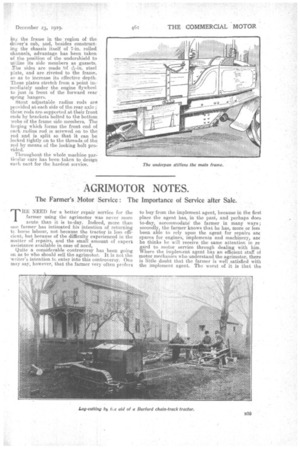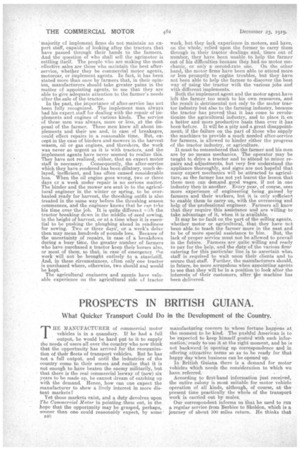A GRIMOTOR NOTES.
Page 17

Page 18

If you've noticed an error in this article please click here to report it so we can fix it.
The Farmer's Motor Service : The Importance of Service after Sale.
THE NEED for a: betterrepair service for the farmer using the agrimotor was never more acute than it is to-day. Indeed, more than one farmer has intimated his intention of returning to horse labour, not because the tractor is less efficient, but, because of the difficulty experienced in the matter of repairs, and the small amount of expert assistance available in ease of need, Quite a considerable controversy has been going on as to who should sell the agrimotor. It is not the -writer's intention to enter into this controversy. One may say, however, that the farmer very often prefers to buy from the implement agent, because' in the first place the agent has, in the past, and perhaps does to-day_, accommodate' the farmer in many ways; secondly, the farmer knows that he has, more or less been able to rely upon the agent for repairs ant spares for engines, implements and machinery, ant he thinks he will receive the same attention in re gard to motor service through dealing with him. Where the implement agent has an efficient staff ol motor mechanics who understand the agrirnotor, there is little doubt that the farmer is well satisfied with the implement agent. The worst of it is that the majority of implement firms do not maintain an expert staff, capable of looking after the tractors that have passed through their hands to the farmers. And the question of who shall sell the agrimotor is settling itself. The people who are making the most effective sales are those who maintain the best afterservice, whether they be commercial motor agents, motorcar, or implement agents. In fact, it ha-s been stated more than once by farmers that, in their opinion, manufacturers should take greater pains in the matter ef appointing agents, to see that they are able to give adequate attention to the farmer's needs after the sale of the tractor.
In the past, the importance of after-service has not been fully recognized. The implement man always had his expert staff for dealing with the repair of implements and engines of various kinds. The service of these men was always, more or less, -at the disposal of the farmer. These men knew all about implements and their use and, in case of breakages, could effect repairs in a reasonable time. But, except in the case of binders and mowers in the harvest season, oil or gas engines, and threshers, the work was never so urgent as it is with tractors, and the implement agents have never seemed to realize this. They have not realized, either, that an expert motor staff is necessary. Consequently, the after-service which they have rendered has been dilatory, much delayed, inefficient, and has often -caused considerable loss. When the oil engine goes wrong, two or three days or a week under repair is no serious matter. The binder and the mower are sent in to the agricultural engineer in the winter or spring, to be overhauled ready for harveet, the threshing outfit is also treated in the same way before the threshing season commences, and the engineer knows that he can take his time over the job. it is quite different with the -tractor lareaking down in the middle of ,seed sowing, in the height of harvest, or at a time when it is essential to he pushing the ploughing ahead in readiness for sowing. Two or three days'' or a week's delay then may mean hundreds of pounds loss. Because of the uncertainty of repairs, in case cf a breakdown during a busy time, the greater number of farmers who have purchased a tractor keep their horses also, or most of them, so that, in ease of emergency the work will not be brought entirely to a standstill. And, in these circumstances, cften only one tractor is purchased where, otherwise, two should anal would be kept.
The agricultural engineers; and agenta have vainable experience on the agricultural side ef tractor work, but they lack experience in motors, and have, on the whole, relied upon the former to carry them through in their tractor dealings and, times out of number, they have been unable to help the farmer out of his difficulties because they had. no motor, me chanic, or only a second-rate one. On the other hand, the motor firms have been able to attend more or less promptly to engine troubles, but they have not been able to help the farmer to discover the best way of using the tractor with the various jobs and with different implements.
Both the implement agent and the motor agent have left the farmer too much to his own resources, and the result is detrimental not only to the motor tractor industry but also to the farming industry, because the tractor has proved that it has come to revolutionize the agricultural industry, and to place it on a better and more productive basis than ever it has been before. It will be a pity and a great disappointment, if the failure on the part of those who supply the machines to provide a much needed after-service for farmers, is allowed to hinder either the progress of the tractor industry, or agriculture.
It must be remembered that the farmer and his men are by no means mechanics. The. operator may be taught to drive a tractor and to attend to minor repairs and. adjustments, -but very few understand the appliance thoroughly, and signs are not hopeful that many expert mechanics will be attracted to agriculture, as the farmer has not yet learnt the lesson that these men can demand good wages, if not in one industry then in another. Every year, of course, sees more experience of engineering being gained by farmers and their workers, but it is only sufficient to enable them to carry on, with the overseeing and help of the professional engineer. Farmers all know that they require this assistance and are willing to take advantage of it when it is available. . It may be no fault on the part of the sellingagents, whether motor or agricultural, that they have not been able to teach the farmer more in the past and to be of more special assistance to him. But, the lack of Proper service must not be allowed to prevail in the future. Farmers are quite willing and ready to pay for the help, and the duty -of the various firm' catering for this particular line is to ascertain whas, staff is required to wait noon their clients and to secure that staff. Further, the manufacturers should, in future, be more Scrupulous when appointing agents to -see that they will be in a position to look after the interests of their customers, after 1,11e machine has been delivered.


























